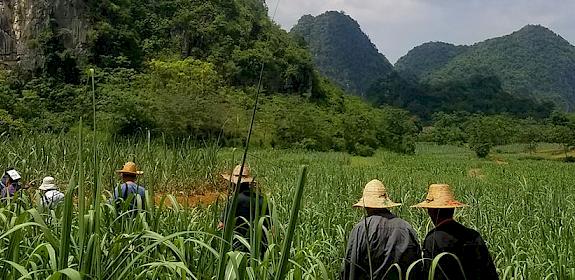Orientation programme for judicial officers in Mizoram
Mizoram, India, 14th September 2011—TRAFFIC India and WWF-India, in partnership with The Gauhati High Court have recently concluded a two day orientation programme on wildlife conservation for the judiciary in Mizoram.
The state of Mizoram in north-eastern India is sandwiched between the neighbouring countries of Bangladesh and Myanmar and has shared borders with the Indian States of Tripura, Assam and Manipur. It lies on a major smuggling route for pangolin scales, live birds, red sanders and medicinal plants.
The orientation programme’s principle aim was to sensitize the Judiciary about issues related to wildlife conservation. The judiciary plays a significant role in championing the cause of forest and biodiversity conservation, and the programme provided a timely update on the status of forest and wildlife legislations, international conventions on related issues and enforcement of wildlife laws in India.
The workshop was held at the Administrative Training Institute, Aizawl, Mizoram and was inaugurated by Dr Garbyal, IFS, Principal Secretary & PCCF, Environment and Forest, Government of Mizoram.
Mr R Thanga, Registrar, Aizawl Bench also presided over the inaugural function, which was graced by the presence of 30 other Judges and Judicial Officers of Mizoram Bench.
Dr Garbyal expressed his appreciation for TRAFFIC India and WWF-India for organizing the event and expressed his concern about building awareness of environment and wildlife-related laws among the Judiciary.
He said “Implementation of wildlife laws will depend on the perception of the judicial officers and judges. When environment and wildlife related cases come to court, the understanding of the judges towards such issues is necessary for undertaking the right decisions. Therefore without proper orientation and training towards these laws, the Judiciary will not be able to do justice to our environment”.
Dr Garbyal also noted that Mizoram and its rich biodiversity demands a greater association of its people and especially its judiciary towards environmental protection and conservation. He urged judicial officers to play a catalytic role in wildlife conservation.
Ms Moulika Arabhi, Director, Centre for Environmental Law, WWF India, said “We want to work in co-ordination with the judiciary to protect the rich biodiversity of Mizoram.”
Mr Khalid Pasha, TRAFFIC India’s Coordinator–Research & Training, emphasized the emergence of organized transnational wildlife crime and stressed the need for co-operation, collaboration and awareness to meet this challenge.
This is the fifth in a series of TRAFFIC India and the Centre for Environmental Law-WWF India training programmes to be conducted for the judiciary across North Eastern States.



